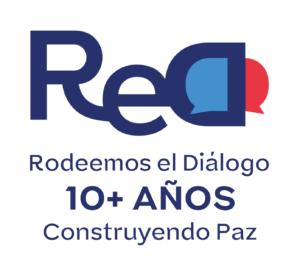Open letter to ex-President Álvaro Uribe – English version
29th October, 2013.
Dear Mr Uribe,
On the occasion of your speech at Senate House, we are writing on behalf of two projects in the UK that have been established in response to the current peace talks between the government of Colombia and the FARC. Rodeemos el Diálogo (ReD) and Plan Perdón are non-partisan initiatives that bring together individuals with differing political views. The projects seek to contribute to the construction of a healthy milieu for the dialogues to take place in, as well as to the societal changes necessary to support a post-conflict scenario. We are inspired by the prospect of peace in Colombia and motivated to learn from other peace processes in the world, as well as from the considerable wealth of international experience across governments, civil society organisations and academia about the transition from conflict to post-conflict.
The main purpose of this letter is to put across the feeling, shared by most participants at our events, that Colombia currently has a golden opportunity to transform to a post-conflict society. This letter conveys the thinking of a broad sector of Colombians and friends of Colombia in the UK regarding the Havana talks.
Galtung, whose work on conflict resolution you must be familiar with from your studies under Fisher, tells us that it is important to seek ‘peace by peaceful means’ wherever possible. The media has, so far, carried your opinion that the conditions for a peaceful solution are not possible. You are followed by a sector of Colombians who embrace that stance. Yet, as you are no doubt aware from your studies, your position is isolated from the international consensus on peace processes. Furthermore, as you will know, Stedman points out that one of the main reasons why negotiations such as these fail is the strong opposition of key sectors of society, resulting in the consolidation of spoilers. In contrast, we celebrate that both parties in Havana have now matured to a realisation that Colombia faces issues which cannot be resolved through the barrel of a gun.
We are more than conscious of the challenges that the last six decades of violence have posed. Therefore we have sought to understand, as Fisher and Ury recommend, the complex history and interests behind the conflict. We and other organisations have invited scholars from around the world to conferences to assess the methodology and development of the current negotiations and to share lessons learnt from other successful peace processes. Despite the protracted progress in Havana, the methodology seems to be working because the talks have yielded agreement between the government and the FARC on one of the thorniest matters of all, land and rural affairs, something which has never happened in the history of previous negotiations.
A well-informed public opinion is key to reconstructing the social fabric of Colombian society. We have realised through talking to other Colombians that it is not easy to heal the wounds of the conflict. Thus we are also gearing our efforts, in ways which reflect experiences from Northern Ireland, to unleashing the power of forgiveness (but not forgetting) by sharing personal stories
from Colombia and beyond. We believe that by spreading these examples we will contribute to a flourishing of reconciliation amongst different sectors of Colombian population.
Canning House, one of the institutions that has facilitated your speech on this occasion, also hosts our series of monthly conversatorios that reflect a deeper yearning for a new start in Colombia. Participants at the second conversatorio concluded that “…the dialogues (in Havana) should remain focused on the points on the agenda and continue to be supported by all Colombians.” The conversatorios are one small part of a broader mobilisation of Colombians, who have patently harboured hopes of a peaceful end to the armed conflict and a harmonious future. Their aspirations are not isolated, as the proliferation of many civil society initiatives in Europe and elsewhere expressing their support for the negotiations demonstrates.
We invite you to familiarise yourself with our initiatives and consider the dynamics which underpin the support shown for them. We also hope that we have outlined with sufficient clarity our reasons why we think you should reconsider your position.
Your planned speech at Senate House is entitled ‘What price is peace in Colombia?’ In reality, Colombians have already suffered enough. But we believe that the price to pay is the energy required to bring the talks in Havana to a successful conclusion, and the vision and strength necessary to build and sustain a just society thereafter.
Yours sincerely,
Rodeemos el Diálogo (www.rodeemoseldialogo.com)
Plan Perdón (www.planperdon.org)
